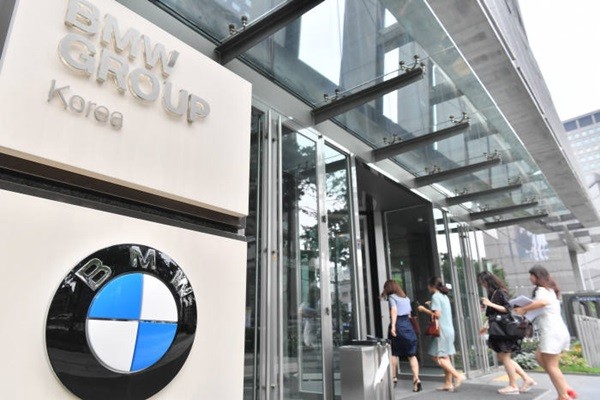Recall of BMW vehicles due to fire that started in the summer of 2018 will mark its first anniversary on the 26th. BMW Group Korea announced its plan to voluntary recall vehicles on the 26th of July and started emergency safety inspection and EGR (Exhaust Gas Recirculation) recall process on 106,000 vehicles. It recalled 65,000 diesel vehicles additionally in October and had carried out the largest recall process for a foreign automotive manufacturer. Although the recall process has reached the highest execution rate in South Korean history, it is expected that the results from police investigation that will be out soon will be BMW Group Korea’s biggest variable with the current recall process.
◊BMW recalls 170,000 vehicles over a year
BMW Group Korea recalled 170,000 vehicles since there was a fire accident involving a BMW vehicle.
According to BMW Group Korea, EGR recall execution rate surpassed 95.5% on the 14th of this month. This percentage is almost 20% higher than an average recall execution rate (70 to 80%) over a year from the start of a recall process. Fact that BMW Group Korea collected EGR of entire 170,000 vehicles in just a year is unprecedented. BMW has continued to call owners of BMW vehicles that were not recalled over phone, text, and mail. It induced a recall by asking for cooperation from 40 rental car companies, car lease companies, and used-car dealerships.
Consumers are still uneasy even though there has not been a fire accident involving an EGR since the recall due to continuous reports on fire accidents involving vehicles of other automotive manufacturers. There are about 5,000 cases annually involving a fire accident of a car. Although fire accident can happen due to faulty parts, there are also other factors such as lack of maintenance, age of a car, and illegal tuning.
Although BMW’s recall center and employees from its dealerships are doing everything they can to complete the recall process, there are still 8,000 vehicles that have not been recalled yet. This is why some say that there needs to be a strict regulation on car owners who are not cooperating with a recall process despite numerous calls.

◊BMW carries out unprecedented measures for recall
Although BMW has faced many hardships due to the recall process, its recall process left positive impression as well by showing a model example to South Korea’s automotive industry through emergency safety inspection and free rental cars.
BMW Group Korea announced its voluntary recall process and follow-up measures as soon as its recall program was approved by Ministry of Land, Infrastructure and Transport (MOLIT). Normally, it takes at least two months to investigate, submit a program, and obtain an approval from MOLIT. However, BMW Group Korea decided to carry out a recall process in just 11 days after MOLIT ordered Korea Automobile Testing & Research Institute to investigate flaws in production.
On the next day, BMW Group Korea started its emergency safety inspection service. Its plan was to have a mechanic inspect the inside of an EGR through an endoscope and come up with a follow-up measure. Although waves of customers visiting service centers caused a problem initially, BMW Group Korea quickly resolved this problem by offering various services such as pickup and delivery service that does not require a customer to visit a service center personally and door-to-door service.
On the 1st of August, BMW Group Korea announced its plan of providing rental cars for the owners of 106,000 BMW vehicles that were going through safety inspection. It established a system that provided rental cars to customers at no cost by working with major rental car companies in South Korea and it also increased number of employees in charge of reservation. When waiting period was delayed due to heavy increase in number of inquiries over phone, it doubled the number of employees of its call center.
◊Lawsuits and police investigation still ongoing
Although recall execution rate surpassed 95%, there are still lawsuits filed by victims and a pending police investigation regarding whether BMW intentionally tried to hide faulty EGR issue. Chairman Kim Hyo-joon of BMW Group Korea who publically made an apology was investigated by the police on the 10th of May for violating Automobile Management Act.
BMW has stuck to its position that it did not hide this issue on purpose and that it found out about the issue right before it executed its recall process. Private-public joint investigation group formed by MOLIT stated at the end of last year that coolant leak from a crack in EGR cooler was the cause of the fire accident.
Victims filed a lawsuit against BMW Group’s Headquarters, BMW Group Korea, and Chairman Kim for violating Automobile Management Act. They requested an investigation on whether BMW delayed its recall process even though it knew about the EGR issue or not. Since then, the police have been investigating whether BMW purposely tried to hide the issue or not.
The police had carried out search and seizure on BMW Group Korea’s Headquarters, EGR manufacturers, and research institutes three times since last year and investigated various representatives. So far, 18 people are booked on a charge. Results from current investigation will be an important factor for deciding degree of punishment on relevant representatives and current lawsuits that are ongoing.
Staff Reporter Jung, Chiyeon | chiyeon@etnews.com